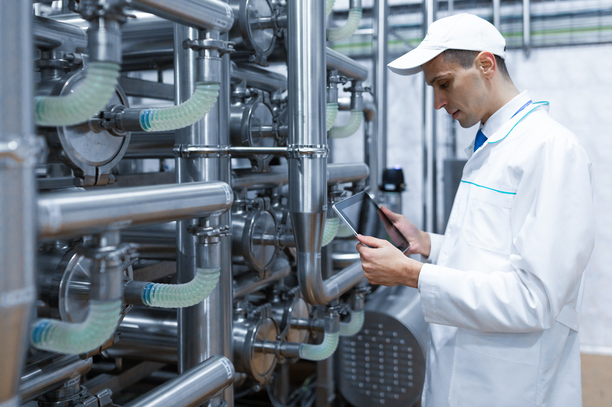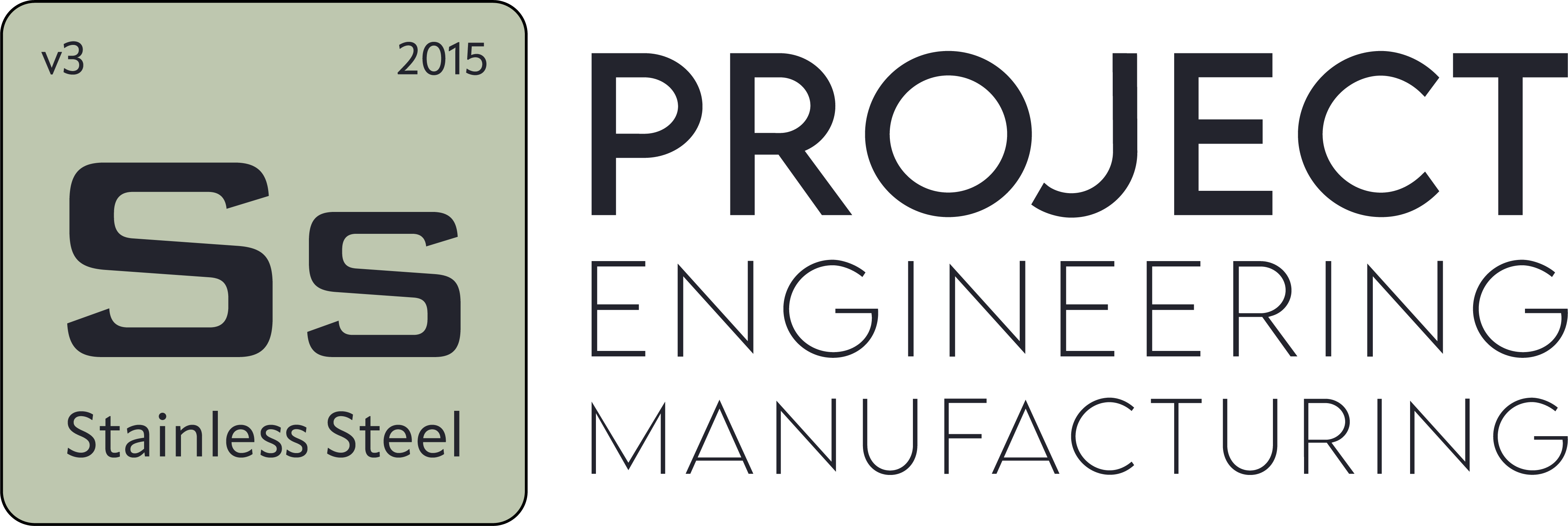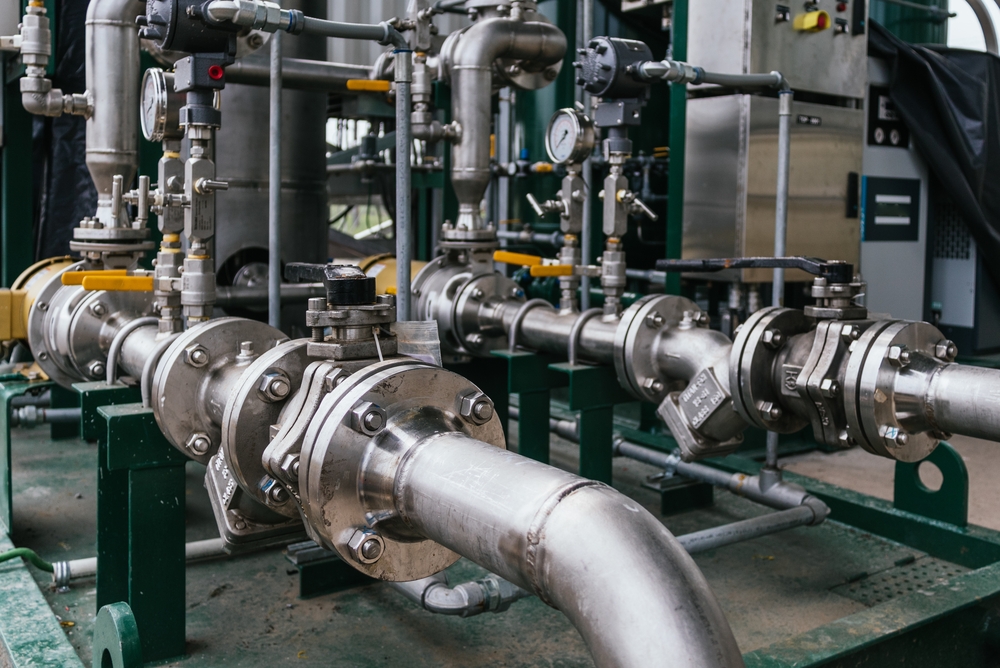Industrial Hygienic Installation
- Blog
- Industrial Hygienic Installation
Industrial Hygienic Installation
What is Industrial Hygienic Piping and Where is it Used?
Industrial hygienic piping refers to specialized piping systems designed to ensure the hygienic transportation of liquids and gases used in production processes. These systems are designed with materials that prevent bacterial growth, are easy to clean, and have high chemical resistance, particularly at points of direct contact with the product. Notably, stainless steel pipes, hygienic valves, gaskets, and specialized fittings form the core components of the system.
Industrial hygienic piping is used in sectors where product safety and quality standards are of critical importance. The main application areas include:
Food and beverage production: Processing and transportation of milk, fruit juice, beer, water, and other food products under hygienic conditions.
Pharmaceutical and biotechnology sector: Safe transportation of medicines and medical products in sterile production environments.
Cosmetics production: Processing of products that come into direct contact with the skin in compliance with hygienic standards.
Chemical industry: Controlled transfer of pure chemicals and liquids.
SS Proje provides engineering solutions tailored to the specific dynamics of each sector in industrial hygienic piping solutions. With our expertise, we make your production processes both safe and sustainable.
What is the Main Purpose of Hygienic Piping in Industrial Facilities?
The primary purpose of hygienic piping in industrial facilities is to ensure the safe transportation of liquids and gases used in production processes without the risk of contamination, pollution, or bacterial growth. In sectors producing products that directly impact human health, these systems are both a legal requirement and an integral part of quality assurance systems.
Hygienic piping systems are designed with smooth, stainless, and easy-to-clean materials that prevent microorganism growth on surfaces in contact with the product. This ensures that product quality is maintained throughout the production line, eliminates contamination risks, and prevents unplanned downtime.
These systems facilitate cleaning and maintenance processes, ensure production continuity, and reduce operating costs. In sensitive sectors such as food, pharmaceuticals, cosmetics, and chemicals, the proper design and implementation of hygienic piping are critical for product safety and brand reputation.
As SS Proje, we provide tailored hygienic piping solutions for industrial facilities, establishing safe, hygienic, and sustainable systems to secure your production processes.

Which Standards Are Hygienic Piping Systems Designed According To?
Hygienic piping systems, used in sectors directly affecting human health, must be designed in accordance with national and international technical standards. These standards ensure the system operates in safe, durable, and sterile conditions.
Some of the most commonly referenced standards include:
ASME BPE (Bioprocessing Equipment): The most comprehensive standard for piping systems in biotechnology, pharmaceutical, and healthcare sectors, detailing material quality, surface roughness, welding methods, and cleaning criteria.
DIN 11850 / DIN 11866: Widely used in Europe, these standards address the dimensions, connection details, and tolerances of stainless steel pipes.
3-A Sanitary Standards: Defines hygiene criteria for equipment used in the food and dairy industries.
FDA (U.S. Food and Drug Administration): Oversees the suitability of surfaces in contact with food and pharmaceuticals.
EHEDG (European Hygienic Engineering & Design Group): A key European organization providing guidance on hygienic design.
We plan and implement all our hygienic piping projects in compliance with these international standards. With the right engineering approach, we ensure both your facility’s safety and support long-term performance.
Why is Stainless Steel Preferred in Industrial Hygienic Piping?
The use of stainless steel in industrial hygienic piping systems offers significant technical and hygienic advantages. As production lines in direct contact with products must be durable, cleanable, and health-compliant, stainless steel stands out as the ideal material.
The main reasons for preferring stainless steel include:
Corrosion Resistance: Offers long-term use even in acidic or alkaline environments, critical for resistance to cleaning chemicals.
Hygienic Surface Structure: Its smooth, non-porous surface prevents bacterial adhesion and microorganism growth, contributing to sterile environments.
Ease of Cleaning: Can be cleaned without leaving residues and is fully compatible with CIP (Clean-In-Place) systems.
Heat and Pressure Resistance: Operates without deformation under high temperatures and pressures, providing significant advantages for process safety.
Longevity and Low Maintenance: Its durability reduces maintenance needs and lowers operating costs.
SS Proje uses only certified stainless steel materials in industrial hygienic piping applications, establishing long-lasting, safe, and standards-compliant systems. This ensures both hygiene and efficiency in your production processes.
What Should Hygienic Piping Be Like in Food Production Facilities?
In food production facilities, hygienic piping is one of the most critical infrastructure components for product safety and consumer health. These systems ensure that water, steam, cleaning chemicals, or liquid food products are transported without contamination. Therefore, the entire piping system must be designed and implemented in accordance with hygienic design principles.
Pipes used in the system must be stainless steel (preferably AISI 304 or 316L), with smooth inner surfaces and flawless welded sections to eliminate bacterial adhesion risks. Welding should be performed using orbital welding technology, and sealing components must use FDA-approved materials. Additionally, the system must be installed with proper slopes to prevent liquid pooling.
Cleaning continuity is essential in food production. Therefore, hygienic piping must be designed to be compatible with CIP (Clean-In-Place) systems and resistant to cleaning chemicals. Connection points should be easily detachable, and valves, gaskets, and filters should be positioned for regular maintenance.
SS Proje considers sectoral requirements and international hygiene standards in hygienic piping solutions for the food industry, creating reliable and sustainable systems tailored to each facility. We expertly build infrastructure that maintains your facility’s production quality.
What Are the Technical Details to Consider in Hygienic Piping Installation?
The installation of hygienic piping systems requires not only the right material selection but also high technical precision. In hygiene-focused sectors like food, pharmaceuticals, and cosmetics, flawless installation is critical for production safety, ease of cleaning, and longevity.
The main technical details to consider during installation include:
Material Suitability: Pipes, fittings, and gaskets must be stainless steel and selected to be compatible with CIP systems. All equipment must comply with international hygiene standards like FDA and ASME BPE.
Slope and Flow Direction: Piping must be installed with appropriate slopes to prevent liquid accumulation and contamination risks. The flow direction should be planned with cleaning and maintenance ease in mind.
Orbital Welding Application: Welding must be smooth, homogeneous, and free of cracks, with weld points polished and no burrs left on the inner surface.
Sealing: Gaskets, gasket seats, and fittings must be installed to ensure micro-sealing, with all connections being hygienic.
Cleaning and Accessibility: All system parts must be accessible during cleaning, avoiding blind spots and enclosed volumes. Manual cleaning or automated CIP lines should be integrated where necessary.
Testing and Approval Process: Post-installation, the system must undergo leak, pressure, and cleaning tests before commissioning.
SS Proje approaches hygienic piping installations with meticulous attention to these technical details. In every application, compliance with standards, long-term use, and hygiene safety are our priorities. We treat the installation process not just as setup but as an engineering phase that guarantees seamless system operation.


